Wed 27 Apr 2022
A Movie Review by David Vineyard: THE FULL TREATMENT (1960).
Posted by Steve under Crime Films , Reviews[8] Comments
THE FULL TREATMENT. Hammer Films/Columbia Pictures, UK, 1960. Also released as Stop Me Before I Kill. Claude Dauphin, Diane Cilento, Ronald Lewis, Francoise Rosnay. Screenplay by Ronald Scott Thorn based on his novel, with Val Guest, who also directed.
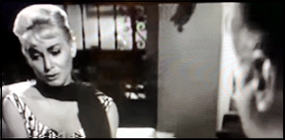
Alan Colby: And the successful ones?
Prade: Well, they derive their reward from a feeling of personal power.
On their honeymoon Alan (Ronald Lewis) and Denise Colby (Diane Cilento) are involved in a terrible car wreck. Alan, a race car driver, is terribly injured and takes a long time to recover, and even when he comes out of the hospital he is still weak and suffering from nerves, tension, paranoia, and the psychological after effects of the traumatic event.
He also fears he may be dangerous after he briefly tightens his hands around her neck during a passionate moment.
On the Riviera to rest up they meet Dr. David Prade (Claude Dauphin … “He’s too elegant to be an aristocrat. Most aristocrats look like peasants.â€) who takes an interest in them both despite Alan’s distrust and aggressive behavior (“…you’re refreshingly rude.â€).
Told by Denise about the accident, Prade reveals he is a psychiatrist, and that he fears Alan may suffer from repressed emotions that could make him dangerous to her and himself, but he overplays his hand and Alan and Denise decide to go back to London and try to start over.
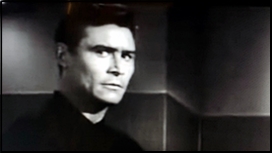
But things are no better in London, and Denise becomes increasingly concerned as she and Alan argue and he becomes more violent. When she learns Prade has followed them to London in his concern for Alan, she finally persuades Alan to see him in his Harley Street offices.
Under intense therapy, he slowly begins to convince Alan to trust him and reveals the trauma that is causing all the problems. Alan is cured and sent home to Denise before they fly out the next day for the start of the racing season.
But when Prade visits the next morning Denise is gone and there are signs of a violent struggle and bloody second hand medical instruments like the ones Alan described under hypnosis as the kind he would use if he was disposing of Denise’s body having killed her.
Prade persuades Alan to let him institutionalize him before going to the police, but on the way to the asylum they are in a wreck, Prade is knocked unconscious and Alan flees.
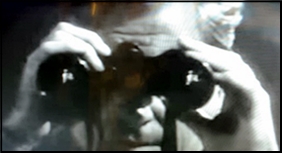
Hiding out on the Riviera Alan watches the London papers expecting to read about Denise’s body being found, and that he is wanted by the police, but then sitting at an outdoor bistro he sees a woman that looks suspiciously like Denise and watches as she climbs on a yacht, owned by Prade…
The Full Treatment based on a novel by fine British suspense novelist and humorist Ronald Scott Thorn (Second Opinion, Twin Serpents, Upstairs Downstairs — the Michael Craig movie, not the Masterpiece series) was directed and co-written by director Val Guest (Penny Princess, The Runaway Bus, The Quatermass Experience, The Day the Earth Caught Fire, Where the Spies Are) for Hammer Studios.
Though this isn’t the only suspense film made by Hammer in this period, it is closer to the Hitchcockian model than films like Maniac, Sudden Fear, and The Snorkel that all had more shocker and borderline horror elements. It’s very much a psychological suspense film and not a shocker.
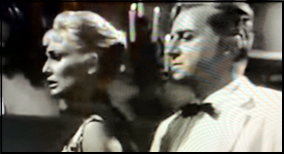
The cast is excellent: Lewis’s well controlled and believably dangerous protagonist; Cilento’s sexy (there is a brief but distant nude scene) and concerned French wife; and Dauphin’s enigmatic Prade, by turns a bit creepy and yet believably solicitous and professional, all hit their marks perfectly. The suspense is genuine and the black and white photography gorgeous and the script intelligent.
Admittedly the movie runs a little long, and perhaps some of the early scenes before they reach London could be tightened or even eliminated, but overall it’s an effective suspense film that ties what seems like loose ends up in the final moments. What holes there are in the plot are no worse than the ones in most Hitchcock films as far as that goes.
I don’t want to oversell this, and I am a fan of Thorn, a suspense novelist in the tradition of Winston Graham, but it is a solid entertaining and attractive suspense film done on a decent budget and well handled all around.
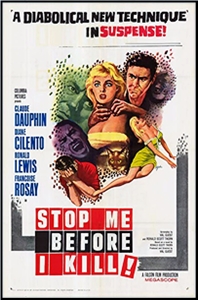
April 27th, 2022 at 10:36 pm
For my view on this film, I posted what I had to say about it here on this blog a few years back:
https://mysteryfile.com/blog/?p=30674
April 28th, 2022 at 12:16 am
Thanks! I had never heard of this movie.
Btw, I think the name is Cilento and not Cliento.
April 28th, 2022 at 9:41 am
It most certainly is. I’ve fixed that. Thanks!
April 28th, 2022 at 3:28 pm
In spite of making quite a few movies in both the UK and US and receiving a couple of Oscar nominations, Diane Cilento is probably best known now for being married to Sean Connery for 12 years or so, back in the 60s and early 70s. Ronald Lewis, no relation, had an OK career, I’d say, but far from a memorable one.
April 28th, 2022 at 5:17 pm
Cilento will always be to me Tom Jones’ (Albert Finney’s) lusty first sex partner in director Tony Richardson’s TOM JONES…
April 28th, 2022 at 5:40 pm
Molly Seagrim: Ah, Tom – you wicked dog!
April 28th, 2022 at 7:43 pm
Cilento and Connery were almost as famous for their arguments as their films for a while, the British equivalent of the Battling Bogarts.
Her voice though is almost as good as his.
The movie, as I said, probably runs about twenty minutes too long which weakens it and ends up rushing the ending a bit, but I still enjoyed it.
April 28th, 2022 at 8:06 pm
Steve,
After rereading your review, the scenes you mentioned being cut are fully restored in the cut of the film currently on YouTube as FULL TREATMENT.
Rather cleverly the film, unable to deal directly with Alan’s impotence, uses his murderous impulses as a metaphor for sexual failure. His “cure” with Prade’s help isn’t entirely convincing, but then Hitchcock’s SPELLBOUND is a bit facile in that area too as are most films dealing with psychology and psychiatry in general and certainly those using them in a suspense film. It’s difficult to deal with such complexity in shorthand in a two-hour film and give it its due.
Lewis best film was probably as the younger cop in JIGSAW (1962 also directed by Val Guest) opposite Jack Warner in a film based on a Hilary Waugh novel with Waugh’s Fred Fellowes transplanted to England and played by Warner.
Films like Hammer’s BANDITS OF KHANDAHAR would probably hurt any actor’s career.